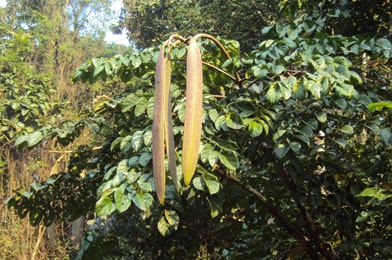Shyonak, Sona Patha (Oroxylum Indicum) - Properties, Benefits & Dosage

Description of Plant
Shyonak (Oroxylum indicum) is small perennial tree extending to a height 8-15m branched at top chiefly grow in evergreen forest.
Its leaves are 0.5-1.5 m long, 2-3 pinnate with opposite pinnae, leaflets 2-4 pairs, 6-12 cm long and 4-10 cm broad, ovate or elliptic, acuminate, glabrous; petioles of the lateral leaflets 6-15 mm long. Flowers are numerous having reddish-purple and pinkish-yellow within, about 0.3-0.6 meter long. The stalk of the flowers is one feet long.
General Description
Shyonak (Oroxylum indicum) has been mentioned in various Ayurvedic text such as Sushrut and Charak samhita. Charak has prescribed Shyonak as antiseptic, astringent and recommended for non-healing ulcers, female disorders and dysentery.
Shyonak leaves are emollient containing anthraquinone and aloe-emodin.
The root bark and stem bark have anti-allergic properties and are being used in treatment of allergic diseases, urticaria, jaundice, asthma, sore throat, laryngitis, hoarseness, diarrhoea, dysentery, infantile, erythema and measles
The chemical constituents of this herb consist of Baicalein, Tetuin, Oroxindin, aloe-emodin and chrysin.
Classification
- Kingdom: Plantae
- Division: Magnoliophyta
- Class: Magnoliopsida
- Order: Lamiales
- Family: Bignoniaceae
- Genus: Oroxylum
- Species: Indicum
Habitat
Found in the warmer parts of India (up to 1000 m of height) also cultivated as an avenue tree. This tree is found throughout India, up to an altitude of 1200m, from Himalaya to Konkan, Malabar, Western Ghats and Coro Mandal. It prefers moist places of deciduous forests and evergreen forests and rarely seen in dry, western area.
Also found in Nepal, China, and Sri Lanka eastwards through Southeast Asia to Philippines and Indonesia.
Names
- English name – Broken Bones Tree, Indian trumpet flower, Midnight horror, Oroxylum, Kampong
- Hindi Name – Sonapatha – Sona means gold
- Telugu Name – Dundilam/ Pampini
- Bengali Name – Sona, Shona
- Marathi & Gujarati Name - Tentu
- Tamil name – Addi
- Assamese Name - Bhatghila
- Kannada Name - Tiguda, Tigadu mara, tattuna, Tigda
- Malayalam Name – Palagapaimani
- Oriya Name - Archangkawm, Phanphania, Tatelo
- Nepalese Name – Tatelo
- Sri Lanka Name - Totila, Thotil
- Chinese Name - Hanyu pinyin : mù húdié, butterfly tree
Ayurvedic Properties
| Hindi / Sanskrit | English | ||
| Rasa | Madhura, Tikta, Kashaya | Taste | Sweet, Bitter, Astringen |
Effects on Doshas
It balances Kapha-Vata doshas.
Classical Categorization
| Charaka Samhita | Sushrut Samhita | Vagbhata |
|
|
|
Ancient Verse about Oroxylum indicum

The Bhavprakash nighantu edition of 1998 verse 25- 26, page no. – 283-285.
The name and property of the Sonapathaare mentioned. Its names are Aralu, Shyonak, Nat, Katvanga, Tuntuka, Mandukaparna, Patrorna, Sukanasa, Dirghavrinta, Aralu, Prithu Shimba and Katammar all are Sanskrit names of Sona Patha. It promotes digestive fire. It is astringent, bitter in taste and pungent after digestion. It manages all three doshas vata, pitta and kapha.
References:-
The Bhavprakash nighantu with elaborated Hindi commentary by Padmashri prof. K.C. Chunekar, edited by Dr. G.S. Pandey: edition of 1998: verse 25- 26, page no. – 283-285.
Practical Uses of Oroxylum indicum
This herbal plant is found to possess anti-inflammatory, diuretic, astringent, expectorant, anti-arthritic, antipyretic, aphrodisiac antifungal and antibacterial activity and is also believed to contain antitumor constituents, and is frequently used because of these properties.
- Decoction of its leaves have good use internally to increase appetite.
- Leaves of Oroxylum indicum herb can be directly applied hot on the skin to treat an enlarged spleen.
- The decoction of its root is useful against diarrhea and dysentery.
- Root is also good to be used in Anorexia.
- The root is even found useful in Rheumatoid Arthritis.
- Roots of this herb has beneficial effects in cough, cold and fever.
- The seeds of this plant contain a purgative agent that make it to be an effective remedy for constipation.
- Paste of seed when applied can treat boils and wounds.
- The paste made of the bark powder is applied for as a remedy for diseases such as mouth cancer, scabies and other skin diseases in some part of the world.
- Use of the powdered seeds can increase the chances of conception.
- It is usually found that people apply the paste of bark in the neck and throat area for quick relief of tonsil pain.
- The Fruit part of the tree is useful to improve the taste.
- Fruit is very good for skin, cleansing the wounds and it also detoxifies the blood.
- This fruit is useful in gynecological disorders and even in case of childhood psychological disorders.
- Fruit is even beneficial for Heart problems.
- The bitter bark of the root is astringent, blood purifier and tonic.
Part Used
- Root
- Bark
- Fruit
- Its leaves and stem are edible.
Dosage
- Powder - 3-6 gm
- Water decoction - 40-80 ml
Caution
- No known side effects have been seen.
- It is found to be safe to use in lactation period and in children.
- During pregnancy it must be used only under medical supervision.



